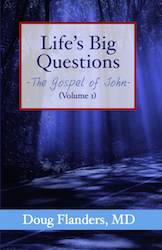
Photo Source: https://gratisography.com/#people
“Anger is a survival mechanism”—that is the secular version of the story we tell ourselves, whenever we lose our cool. Our ancestors survived because they killed others while avoiding being killed themselves. It is all about survival of the fittest, and anger gave our ancestors the edge they needed. Acting first and asking questions later provided an evolutionary advantage. We are merely products of the refining hand of history, and anger is a by-product of that process.
The Bible, of course, gives a slightly different account of things. It shows that anger was with us from the very beginning, when Cain slew his brother Abel. The first two people born of woman, and one of them promptly kills the other. It didn’t take the human race long! Millions of years and thousands of generations were not required. No wonder Scripture is replete with warnings about the dangers of anger.
“But our anger is righteous anger”—that is the spiritualized version of the story we tell ourselves, whenever we lose our cool. You know, we are just like Jesus in the temple, except that we’re in traffic instead of the temple and the moneychangers are the other drivers. It is very satisfying to vent our wrath and feel that we are somehow being Christ-like, all at the same time. Makes a person feel sorry for the non-Christians: they’re just being obnoxious, whenever they throw a fit.
It is very satisfying to vent our wrath and feel that we are somehow being Christ-like, all at the same time.
- What is the worst you have ever lost your temper? What is the most common reason you lose your temper?
- What is the worst you have ever witnessed someone else lose his or her temper? Was it frightening? Did it seem Christ-like in any way?
- James 1:20 tells us, “The anger of man does not achieve the righteousness of God.” (NASB) When you reflect on the times you have given in to anger, do any of those times qualify as righteous or Christ-like anger?
- The Bible commands us in Ephesians 4:6, “Be ye angry, and sin not.” (KJV) This would imply that it is possible to be angry without sinning. What would that look like? Does the reason behind the anger make a difference? What sort of behavior would be acceptable as non-sinful anger? What sort of behavior would be out of bounds?
- Christ is our example, but He is also God. Are there things He is able to do as God that we as mere mortals need to be careful about emulating? Might anger fall into that category?
We have very few examples of Christ getting angry. In John 2:13-25, it was directed at a very specific problem with a very specific group of people at a very specific time in history. Let’s examine those details and see if we can discern what Jesus—and ultimately His Heavenly Father—were so upset about and how it should influence the way we live today.
The original Tabernacle was built by Moses, in about 1450 BC, a year after the Exodus from Egypt. It was mobile, just like the Israelites themselves at the time.
After the Hebrews were comfortably settled in the Promised Land, however, King Solomon built the more “permanent” First Temple, about a thousand years before the ministry of Christ (1 Kings 6-9). Almost immediately, the First Temple began to accumulate wealth from around the world.
In 586 BC, the Babylonians under Nebuchadnezzar could no longer resist the temptation of such massive riches (estimated in the tens of billions), so they plundered the Temple and then razed it to the ground.
With permission from the Persians (who had recently conquered the Babylonians), the Jews were allowed to rebuild a Second Temple. The account is found in the books of Ezra and Nehemiah: Construction began under Cyrus and was completed under Darius in 516 BC.
The Second Temple rapidly accumulated wealth, as well, in the form of the Temple tax. Although it never reached the splendor of Solomon’s First Temple, it had acquired substantial assets (estimated in the hundreds of millions) by the time of Jesus’ ministry, having survived both the Greek and Roman occupations.
John’s account of Jesus’ cleansing of the Second Temple occurs at the beginning of Christ’s ministry. He quotes Jesus as saying, “Take these things away; stop making My Father’s house a place of business.”
It is not until three years later, when He cleanses the Temple a second time, as recorded in the other three gospels, that Christ uses the phrase “den of thieves.” Apparently, the Jews had not gotten the message the first time, but had only progressed from bad to worse. It was shortly after this second cleansing that Jesus was killed, just as He’d predicted in the Parable of the Vineyard Owner (Luke 20:9-19).
Less than 40 years later, in 70 AD, the Romans destroyed the Second Temple. In the ensuing fire, the gold and silver within the Temple melted and ran between the stones of the Temple’s foundation. The soldiers tore up the stones to retrieve the precious metals, and all that remains of the Second Temple today is a portion of a retaining wall known as the Western Wall or Wailing Wall, where Jews can mourn what once was (the First and Second Temples) and look forward to the Third “eternal” Temple when Messiah returns (Ezekiel 40-47 and Revelation 21-22).
- Read 1 Kings 9:4-9. Under what conditions would God allow the First Temple to be destroyed?
- Did Israel and her kings serve “other gods?”
- Do you think money or wealth might have been one of those gods?
- Matthew 6:19-21 says,
“Do not store up for yourselves treasures on earth, where moths and vermin destroy, and where thieves break in and steal. But store up for yourselves treasures in heaven, where moths and vermin do not destroy, and where thieves do not break in and steal. For where your treasure is, there your heart will be also.” (NIV)
Had Israel stored up earthly treasures? Was that where their heart could be found? Does Babylon and Rome looting the two Temples qualify as “thieves breaking in and stealing” but on a large scale?
For where your treasure is, there your heart will be also.
In the Parable of the Vineyard Owner referenced above, the vineyard owner (God) kills the original vine-growers (the Jewish leaders) and replaces them with new ones (the apostles). The Christian Church (primarily converted Jews) then takes up the story both physically and spiritually where the Jewish story (to a great degree) ended with the destruction of the Second Temple by the Romans.
Within a few hundred years, Christianity would become the official religion of the Roman Empire. The Roman Catholic Church would dominate European History for over a millennium and a half, longer than the Tabernacle, the First Temple, and the Second Temple combined.
What is fascinating, as one travels throughout Europe, is the number and splendor of the cathedrals scattered across the landscape. It is truly breathtaking. Pictures cannot do justice to the beauty and magnitude of these architectural marvels. St. Peter’s Basilica in Rome is simply astounding.
But sadly, many of these beautiful houses of worship are falling into disrepair. There is simply no funding or even interest in maintaining them. It is a solemn reminder that all material things, no matter how carefully engineered or beautifully constructed, are in fact only temporary.
All material things…are in fact only temporary.
- Would the gradual disrepair of the European cathedrals qualify as “moths and vermin” slowly destroying these historical treasures?
- Did the Roman Church put too much emphasis on physical structures? Does that seem to be “where their heart was?”
- Is it possible that they used the construction projects as a way to employ the poor? Might that have been their primary objective?</li>
- Could God have used the Roman Church to preserve artwork, literature, and a variety of other historical artifacts that might otherwise have been lost?
As Europe has become more and more secular, America has become, to a large degree, the focal point of Christianity. The question is, “How are we doing?” Are we focused on eternal things (God and other people) or temporary things (money and possessions)? Will the things we have built eventually be looted or fall into disrepair, or will they stand the test of time?
NOTE: 
 This post is adapted from my Life’s Big Questions Series, which encourages readers to examine all of life’s questions in the light of Scripture.
This post is adapted from my Life’s Big Questions Series, which encourages readers to examine all of life’s questions in the light of Scripture.
Whether used for personal devotions, as family discussion guides, or in a study group, this series provides an invaluable resource for enhancing your spiritual walk.